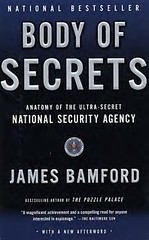
Body of Secrets: Anatomy of the Ultra-Secret, By James Bamford
Originally uploaded by panafnewswire.
AFP
A US judge halted warrantless wiretapping by the National Security Agency and ruled that President George W. Bush overstepped his authority when authorizing an unconstitutional program.
Federal Judge Anna Diggs Taylor ordered a permanent injunction barring the Terrorist Surveillance Program, which has been used to monitor millions of US citizens.
"It was never the intent of the (Constitutional) framers to give the president such unfettered control, particularly when his actions blatantly disregard the parameters clearly enumerated in the Bill of Rights," Taylor wrote in a 43-page opinion.
The ruling was immediately appealed by the NSA and the injunction was temporarily stayed ahead of an appeals court ruling.
The decision was a significant blow to Bush's attempts to expand presidential powers in response to the terrorist attacks of September 11, 2001.
It comes just weeks after the Supreme Court ruled that the Bush administration overstepped its authority in setting up military tribunals to try war on terror detainees held at the US naval base in Guantanamo Bay, Cuba.
"It's pretty sweeping," said Robert Bennett, a professor at Northwestern University's law school, noting that the ruling went beyond faulting the administration for violating Congressional rules on wiretapping.
"The Bush administration is losing pretty regularly on assertions that it's overstepping its authority."
The wiretapping suit was filed in Michigan by the American Civil Liberties Union on behalf of a number of journalists, lawyers, scholars and rights workers who believed their communications had been monitored.
They argued that the program prevented them from doing their work because people were afraid to speak with them on the telephone or send e-mails that could be monitored.
Taylor ruled that they had faced "irreparable injury" because the surveillance program violated their rights to free speech and protection from unwarranted searches.
"The public interest is clear, in the manner," Taylor wrote. "It is the upholding of our constitution."
The decision was hailed by the ACLU.
"Today's ruling is a landmark victory against the abuse of power that has become the hallmark of the Bush administration," said Anthony Romero, executive director of the ACLU.
"Government spying on innocent Americans without any kind of warrant and without Congressional approval runs counter to the very foundations of our democracy."
The White House sharply criticized the ruling and said the program was "firmly grounded in law and regularly reviewed to make sure steps are taken to protect civil liberties."
"United States intelligence officials have confirmed that the program has helped stop terrorist attacks and saved American lives," White House Press Secretary Tony Snow said.
"That's what the American people expect from their government, and it is the president's most solemn duty to ensure their protection."
Congress restricted the use of electronic surveillance of citizens after the Watergate scandal which brought down President Richard Nixon.
The Foreign Intelligence Surveillance Act created a secret court which has only denied three requests in nearly 30 years and which allows law enforcement to initiate surveillance before the warrant is obtained.
"It's not the most difficult statute to comply with but they do have to have some reasonable belief that the person may commit a crime," said Evan Caminker, dean of the University of Michigan's law school, explaining that this ruling outlaws "fishing expeditions."
Democrats said the ruling highlighted Bush's skewed priorities.
"Rather than griping about having to go to a FISA court for legal clearance to wiretap potential terrorists, the Bush Administration should fully inspect cargo put on passenger planes and make sure that a nuclear bomb isn't sent on a container ship to a major US port," said Representative Ed Markey, a senior member of the House Homeland Security Committee.
Senator Ted Kennedy said Bush's cavalier decision to make up his own rules undermined national security.
"By ignoring that law, the Administration took a path filled with legal uncertainty, putting employees of the National Security Agency at risk of criminal penalties and jeopardizing prosecutions of terrorists who may be able to successfully challenge the evidence against them," Kennedy said.
No comments:
Post a Comment